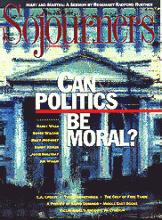The election of 1988 may mark a culmination and turning point in the recent relations of politics and religion. These are no more separable than are politics and morality; but the ties between religion and electoral issues have been very narrowly framed by right-wing Republicans in elections of the Reagan era.
The Moral Majority and its cognate groups argued, with some plausibility, that a secular elite culture had lost touch with the mainstream religious values of our society. A candidate like Michael Dukakis, who was tone deaf to much in our culture beyond its religious aspect, let this oversimplification gain respect with many Americans.
There was an opportunistic aspect to this Republican ploy. But it would not have worked so well if certain Democrats had not accepted a number of its premises--for example, that separation of church and state must entail a separation of politics from religion. Since many Americans have formed their ideas of morality in a religious context, what secularists seemed to be calling for was the exclusion of morality itself from the discourse of the electorate.
The Religious Right could, because of these perceptions, thunder at its opposition as godless, anti-religious, and amoral without looking entirely ridiculous. But that is becoming more difficult in this electoral season.
For one thing, Democrats are not as cooperative in accepting the caricature the Republicans try to foist on them. This is, more than has been widely recognized, the result of having two Southerners at the top of the Democratic ticket. Politicians in the South have never been able to ignore religion--certainly they cannot with electoral impunity defy religion. This is as true of Democrats, whose black constituents have followed preachers to the polls, as of Republicans, whose businessmen attend prayer breakfasts.
Read the Full Article

